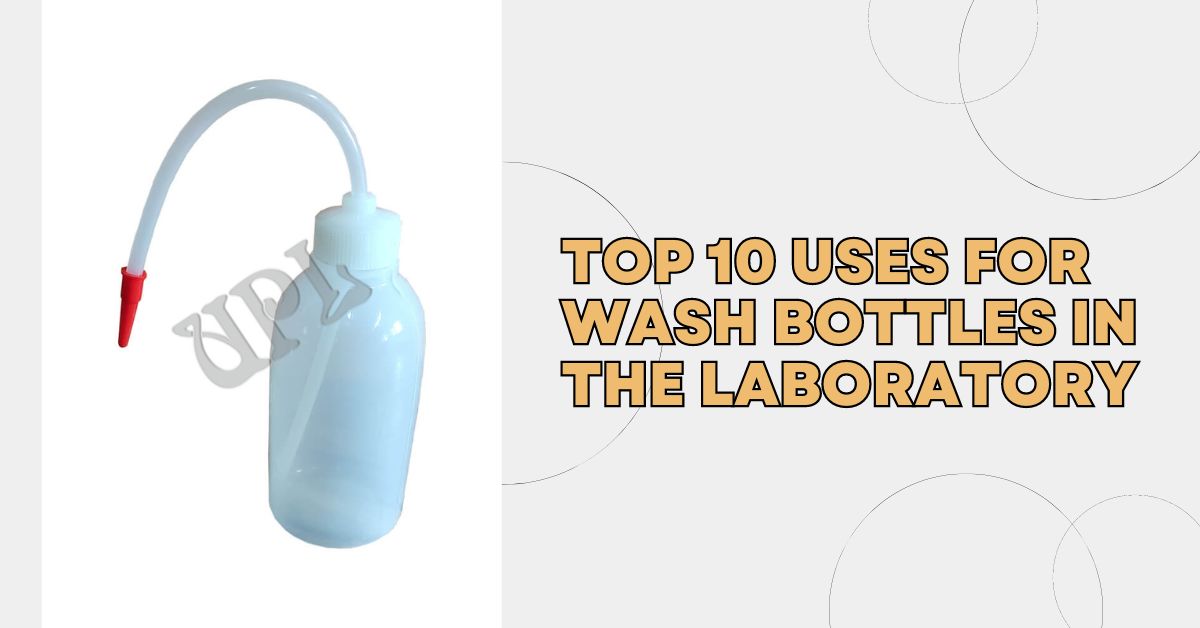In any laboratory setting, wash bottles are indispensable tools that play a crucial role in maintaining cleanliness, precision, and efficiency. These simple yet versatile containers, typically made of plastic with a nozzle for directed liquid flow, are found on nearly every lab bench. In this blog post, we’ll explore the top 10 uses for wash bottles in the laboratory, highlighting their importance in various scientific procedures.
- Rinsing Glassware
One of the primary uses of a wash bottle is for rinsing laboratory glassware. Whether you’re cleaning beakers, test tubes, or pipettes, a wash bottle allows for precise and controlled rinsing. The narrow nozzle directs a stream of water or solvent exactly where it’s needed, ensuring thorough cleaning without excessive waste. - Diluting Solutions
Wash bottles are excellent for diluting concentrated solutions. The controlled flow from the nozzle allows scientists to add small amounts of solvent gradually, achieving the desired concentration with precision. This is particularly useful when working with small volumes or when exact dilutions are critical. - Washing Precipitates
In filtration processes, wash bottles are used to wash precipitates collected on filter paper. The directed stream from the wash bottle can effectively remove impurities or madre liquor from the precipitate without disturbing the solid material. - Transferring Liquids
For small-volume liquid transfers, a wash bottle can be more convenient and precise than pouring from a larger container. This is especially useful when working with volatile solvents or when transferring liquids to narrow-necked vessels. - Spot Testing
In analytical chemistry, wash bottles are often used for spot tests on filter paper or thin-layer chromatography plates. The controlled dispensing allows for precise application of reagents, which is crucial for accurate results in these sensitive tests. - Cleaning Work Surfaces
Maintaining a clean work area is essential in any laboratory. Wash bottles filled with appropriate cleaning solutions or disinfectants are perfect for quickly cleaning up spills or sanitizing work surfaces between experiments. - Adjusting pH
When fine-tuning the pH of a solution, a wash bottle filled with dilute acid or base can be used to add small amounts of the adjusting solution. This method allows for more precise control compared to using droppers or pipettes, especially for larger volumes. - Preparing Thin-Layer Chromatography (TLC) Chambers
In TLC experiments, wash bottles are used to add the mobile phase to the development chamber. The narrow nozzle allows for careful addition of the solvent along the sides of the chamber without disturbing the atmosphere inside. - Cooling Small Equipment
In some procedures, small equipment or reaction vessels may need quick cooling. A wash bottle filled with cold water or other cooling liquids can be used to apply a controlled stream to the exterior of the vessel, providing localized cooling. - Flame Tests
For flame tests in inorganic chemistry, wash bottles filled with specific salt solutions are used to apply the sample to the flame. The fine stream from the wash bottle allows for a controlled and consistent application, resulting in more reliable observations of flame color.
Wash bottles are versatile and essential tools in any laboratory setting. From rinsing glassware to performing precise chemical tests, these simple devices contribute significantly to the accuracy and efficiency of scientific procedures. By understanding and utilizing the various applications of wash bottles, laboratory professionals can enhance their work practices and achieve more reliable results.
As we’ve explored in this overview, the humble wash bottle is far more than just a container for rinsing. Its design and functionality make it an invaluable asset for a wide range of laboratory tasks. Whether you’re a seasoned researcher or a student just starting in the lab, mastering the use of wash bottles will undoubtedly improve your experimental techniques and overall laboratory experience.






